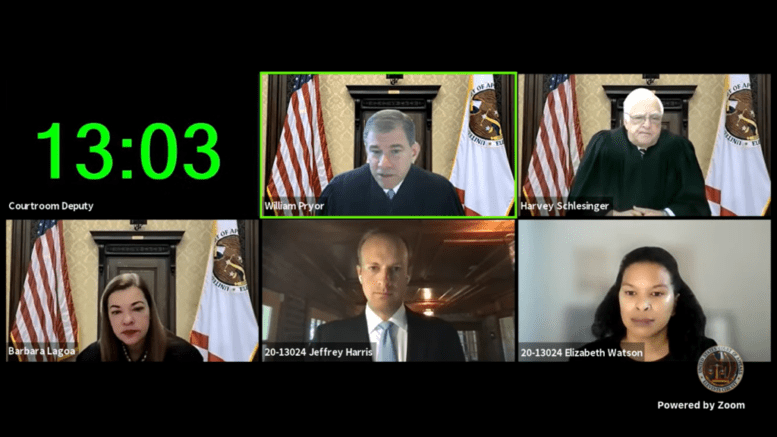by Ross Williams, Georgia Recorder This article first appeared in the Georgia Recorder, republished with permission
June 24, 2022
This story was updated at 5:45 p.m. Friday, June 24, 2022.
The Supreme Court’s decision Friday overturning Roe v. Wade began a major shift in Georgians’ future access to abortion, but how exactly that shift will play out remains to be seen.
Abortion remains legal in Georgia up until 20 weeks into a pregnancy, but that is likely to change.
The Legislature in 2019 passed a bill banning the vast majority of abortions once fetal cardiac activity is detected, which is usually about six weeks into a pregnancy and before many women know they are pregnant.
That law has never taken effect, however. In 2020, the U.S. District Court for the Northern District of Georgia ruled that the bill was unconstitutional and blocked it from going into effect following a lawsuit filed by the ACLU of Georgia representing SisterSong Women of Color Reproductive Justice Collective and other providers.
The state appealed the ruling to the 11th Circuit Court of Appeals, which paused its proceedings pending the Supreme Court’s ruling on Dobbs.
Following the decision, Georgia Attorney General Chris Carr quickly filed notice Friday afternoon asking the court to let the law take effect.
“I believe in the dignity, value and worth of every human being, both born and unborn,” Carr said in a statement. “The U.S. Supreme Court’s decision in Dobbs is constitutionally correct and rightfully returns the issue of abortion to the states and to the people – where it belongs.
But instead, the court directed the parties in the case to file more written briefs addressing the effect the Supreme Court’s decision would have on the state’s appeal within the 21 days.
“Despite Attorney General Carr’s race to the courthouse, abortion is safe and legal in Georgia for the near future. The ACLU of Georgia will continue to defend the rights of Georgia’s women from forced pregnancy,” Andrea Young, executive director of the ACLU of Georgia, which is representing the plaintiffs in the case, said in a statement Friday evening.
There is little getting in the way of the court putting the law into effect immediately, New Georgia Project director of legal affairs Tangi Bush said Friday afternoon.
“Considering that the oral arguments on SisterSong v. Kemp were heard in September 2021, there’s nothing to state that there has not been an opinion written up already,” she said. “It simply needs to be filed. There’s nothing necessarily additionally that has to happen prior to the 11th Circuit making a decision on that because they’ve already heard the arguments, reviewed the briefs, et cetera.”
But just because it could come quickly does not mean it will, she added.
“That doesn’t necessarily mean that it’ll be immediately. It does not necessarily mean it will be tomorrow, doesn’t necessarily mean that it’ll be a month from now. But there’s nothing to stop them at this point because all they did was put a stay on the case and a permanent injunction on HB 481.”
Once the court acts, abortion providers would need to comply with the law immediately.
“The moment that they enter an order on that case, if it does, in fact, remove the injunction, an order is effective the moment that it’s filed, so it’d be an instantaneous effect on activity in Georgia,” Bush said.
Republican Gov. Brian Kemp said that’s what he’s hoping for, calling Friday’s Supreme Court decision “a historic victory for life” in a statement.
“I look forward to its impact on the legal proceedings surrounding Georgia’s LIFE Act, and hope our law will be fully implemented and ultimately protect countless unborn lives here in the Peach state,” Kemp said in a statement. “Working closely with the General Assembly, we have made significant strides to stand for life at all ages — from adoption and foster care reform, to combatting human trafficking and passing the heartbeat bill — and we will continue that important work in the days and months to come.”
Kemp’s opponent in this year’s election, Democrat Stacey Abrams, predicted the change will come in a matter of weeks.
“If you are a woman in Georgia, you should be terrified right now,” Abrams said in a Friday call with reporters. “In this state, the law of the land soon will be — and I think it’s going to take a matter of weeks for the Supreme Court decision to be entered, for Dobbs to be entered, and for the 11th Circuit to vacate their hold on Kemp’s forced pregnancy law, but what will happen is that women in this state will not have access to the type of reproductive care that they need.”
“I think the law is vague. I think it is wrongheaded. I think it is mean spirited. And I think unfortunately, the current composition of the court strongly suggests that it will be the law of the land in a matter of weeks,” she added.
Georgia Recorder Deputy Editor Jill Nolin contributed to this report.
Georgia Recorder is part of States Newsroom, a network of news bureaus supported by grants and a coalition of donors as a 501c(3) public charity. Georgia Recorder maintains editorial independence. Contact Editor John McCosh for questions: info@georgiarecorder.com. Follow Georgia Recorder on Facebook and Twitter.
